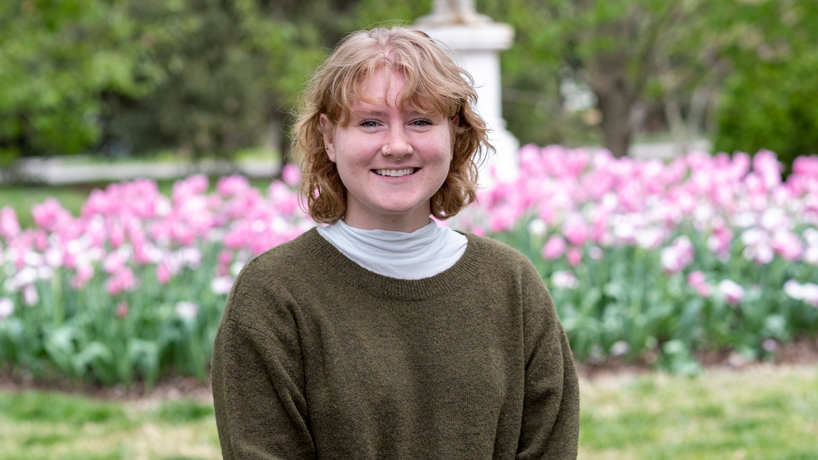
Since transferring to UMSL in 2019, Madison Halbrooks has been active in campus conservation efforts through the Environmental Adventure Organization, the Green Team and the Sustainability Office. She is set to graduate with a BES and a minor in environmental studies with an eye toward environmental education in the future. (Photo by August Jennewein)
One person’s recycling is another person’s revelation. At least, that was the case for Madison Halbrooks when she began volunteering with earthday365.
The St. Louis organization does waste diversion at events in the region, which is the process of recycling, composting or reusing waste that would have otherwise ended up in a landfill.
The experience introduced her to the concept of climate justice and established a passion for environmental work.
After transferring to the University of Missouri–St. Louis from Southwestern Illinois College in 2019, Halbrooks immediately became active in campus conservation efforts through the Environmental Adventure Organization, the Green Team and the Sustainability Office. She’s now poised to graduate with a BES and a minor in environmental studies with an eye toward environmental education in the future.
Biology was Halbrooks’ major when she matriculated to UMSL, but a chance encounter convinced her to change course within a few months of arriving. While investigating ways to get involved with environmental groups, Halbrooks met Katy Mike Smaistrla, the energy and environmental coordinator for the UMSL Sustainability Office.
“She had worked closely with the educational studies major,” Halbrooks said. “She was pointing me to that major because I was like, ‘I don’t know if biology is the right path for me.’ I was wanting to be more on the educational side of environmental stuff.”
Smaistrla also supported Halbrooks’ passion for environmentalism and climate justice by appointing her president of the Green Team, a group that meets regularly to discuss ways for faculty, students and staff to further initiatives identified in the Campus Sustainability Action Plan, and hiring her as the student sustainability officer.
In both roles, she helped coordinate a variety of initiatives and events to raise awareness and build a more sustainable campus. One such initiative was the Bottled Up program. Members of the Green Team collected water bottles left behind in the Millennium Student Center and sanitized them, so they could be redistributed and used again.
Halbrooks also organized screenings of movies focused on environmental issues such as “Atomic Homefront,” a documentary about the effects of radioactive waste in the West Lake Landfill in north St. Louis County, and “Awake, A Dream From Standing Rock,” a documentary about the water protectors protesting the Dakota Access Pipeline on the Standing Rock Reservation.
The event that got the biggest response from students was a clothing swap.
“That was an effort to reduce clothes going into the landfill and also purchasing fast fashion,” Halbrooks said. “It was a way for students on campus to refresh their wardrobe without having to go buy things at the mall. That was probably my favorite event that we did.”
The Green Team also started a residential recycling program shortly before the onset of the COVID-19 pandemic last year. Halbrooks said it had to be paused briefly, but it has resumed service.
She’s also enjoyed participating in Arbor Day celebrations and working in the UMSL Community Garden with the Environmental Adventure Organization. Although the club also ventures off campus for nature activities such as rock climbing and hiking, as well as river cleanup efforts.
Though these are more than extracurriculars for Halbrooks.
Halbrooks sees addressing climate change and issues of climate justice as imperative work. She explained that climate justice is the intersectional part of climate change, which frames it as an social justice issue – not just an environmental issue.
The concept relates the effects of climate change, such as extreme weather events, sea level rise and ocean acidification, which will disproportionately affect low-income and black, indigenous and people of color communities, to human rights and social justice.
As she learned more about it, she felt obliged to share the message of climate justices leaders with others.
“I started learning more about climate justice and environmental intersectionality, and I wanted to focus more on the people side of climate change – how it disproportionately affects communities,” Halbrooks said. “I wanted to focus on that learning, teaching and educational aspect more than the science side.”
Halbrooks is excited for graduation, albeit a little disappointed she didn’t get to spend more time on campus during the past school year.
She envisions working for an environmental organization that specializes in climate justice but could also imagine working at a national park or museum doing interpretation, a type of education done at informal learning sites to help visitors find meaning in connecting a site to broader issues such as climate change.
“My hope would be to continue supporting and learning about climate justice for all people,” she said.














